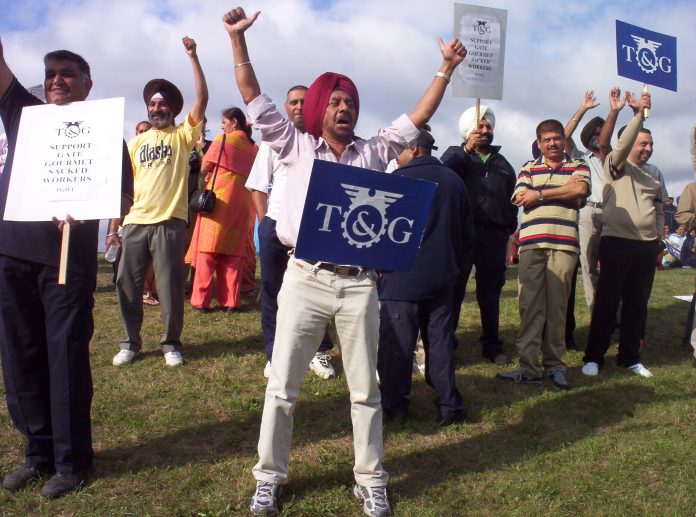
Vindicating Palestinian fears of transforming the Gaza Strip into the world’s largest prison, Israel on Monday ruled out giving the Palestinians their own gate to the world.
The Israelis insisted at the last minute on Monday it will control traffic in and out of Gaza after Israeli settlers and soldiers leave, as the PNA confirmed that Israel’s unilateral withdrawal ‘will not change the legal status’ of the ‘evacuated’ areas and the Israeli state ‘will remain an occupying power’.
Just a week before the pullout begins, Israel’s Security Cabinet met on Monday to consider how to deal with the crossing point at Rafah between the Gaza Strip and Egypt.
Rather than endorse a plan for international inspectors to handle customs and security, the Israelis insisted on moving the crossing to the point where Gaza, Egypt and Israel meet – and on retaining Israeli control.
Israel also threatened to cancel the customs union with the Gaza Strip if the Palestinian National Authority (PNA) and Egypt refuse to build a new border terminal near ‘Kerem Shalom’ to replace the existing one in Rafah, the security cabinet decided.
‘Israel wants to transfer the Rafah crossing to Kerem Shalom together with the Palestinians and the Egyptians, to maintain the customs and security arrangements.
‘If we cannot reach an agreement, the ministries will act to move the customs envelope to the Erez and Karni crossings after the disengagement,’ the Sharon security cabinet said in a statement.
The cabinet said that Israel would insist on the ‘demilitarisation’ of the Gaza Strip after the pullout and demand that the PNA take over security responsibility and prevent ‘terrorism’.
The cabinet also decided to recognise a three-mile strip off the Mediterranean coast as the Gaza Strip’s territorial waters, after completing the disengagement and pulling out of the Philadelphi route.
However Israeli ‘Defence’ Minister Shaul Mofaz also told the ministers that Israeli troops could leave the Gaza-Egypt border by the end of the year if the deployment of some 750 Egyptian soldiers there goes smoothly, thus maintaining a window of hope for resolving the issue.
The Israeli cabinet’s decisions indicate that key issues will be left unresolved with the PNA when the pullout begins.
The Rafah crossing to Egypt is Gaza’s only link to the outside world, as the seaside territory is surrounded on the other two sides by Israel.
Israel has controlled the Rafah crossing since it occupied Gaza in the 1967.
Israel maintains the pullout will end its occupation, but Palestinians and international agencies say if Israel continues to control Gaza’s borders, air space and seacoast, it will still be considered an occupier.
Speaking in the closed Security Cabinet meeting, Shaul Mofaz made clear Israel is not prepared to trust the Palestinians to handle security and commerce by themselves, and ruled out ‘for now’ the possibility of foreign inspectors replacing Israeli guards.
Palestinian Civil Affairs Minister in charge of the Israeli disengagement profile from Gaza Strip and four small settlements in the northern West Bank, Mohammed Dahlan said on Sunday that the Rafah border terminal with Egypt must be fully controlled by the Palestinians, in addition to a safe passageway linking Gaza to the West Bank.
‘If Israel does not pull out from the crossing and the Philadelphia route, nothing will change in the life of the Palestinian People as eventually the Gaza Strip will be sealed off – a big jail,’ Dahlan said.
He also noted that the Palestinian leadership did not consider the imminent Israeli pullout as an end to the Israeli occupation from the legal viewpoint, as long as Israel retains control of the aerial space of the Strip.
Similarly the PNA Foreign Ministry asserted that the Israeli planned withdrawal from Gaza ‘will not change the legal status’ of the land from which the Israeli Occupation forces (IOF) will pull out.
And the Jewish state ‘will remain an occupying power in accordance with the international law’.
‘Israel will remain an occupying power bearing the legal and humanitarian responsibility,’ in accordance with the Fourth Geneva Convention and The Hague obligations of 1907, the Ministry said in a statement on Monday.
Palestinian spokeswoman Diana Buttu added: ‘Israel claims it wants to get out of Gaza but in reality it wants to continue to control Gaza.’
She warned: ‘What Israel really seeks to do is to control Gaza both militarily and economically by moving the Rafah crossing.’
Meanwhile, a senior EU official on Monday said that the European Union is willing to provide customs officers for the future international border between the Gaza Strip and Egypt.
The unnamed official said Shimon Peres, Israel’s deputy prime minister, had approached the 25-country bloc with a request to deploy inspectors after Israel pulls out of Gaza in the coming weeks.
The EU official said the European Union ‘is happy to play a positive role, if it’s backed by all parties,’ including the Palestinians and Egyptians, and that the consultations with Israelis and Palestinians were ongoing.
The deployment of foreign inspectors is supported by the international Quartet’s envoy James Wolfensohn, who has been trying to broker an agreement between the two sides on border crossings.
The issue of foreign inspectors was being discussed on Monday by Israel’s Security Cabinet.
Under the current arrangement, Israeli troops patrol a narrow strip between Gaza and Egypt – the so-called Philadelphia road – and Israeli security and customs inspectors are posted at the Rafah crossing.
The Israeli Cabinet on Sunday gave its final approval to the first stage of the Gaza pullout – the dismantling of the isolated Netzarim, Kfar Darom and Morag settlements.
Israeli Finance Minister Benjamin Netanyahu resigned from his post on Sunday to protest against next week’s withdrawal from the Gaza Strip, saying the plan will create a ‘base for Islamic terror’ in Gaza.